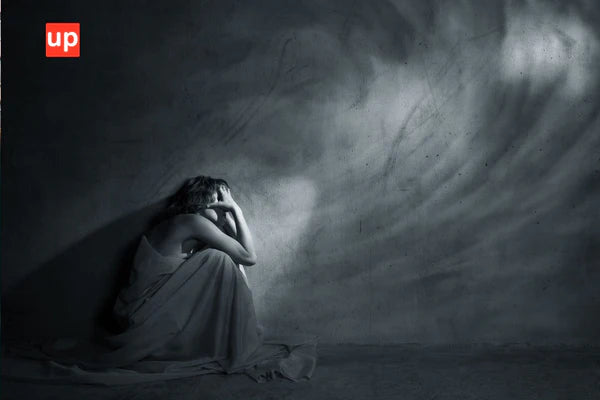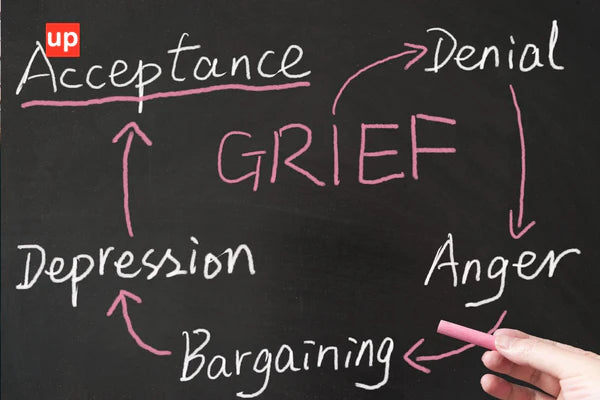Grief is a deeply personal journey with common signposts known as the ‘stages of grief’. If you’re seeking to understand these emotional shifts, know that the path is neither straightforward nor the same for everyone. This article sheds light on each stage of grief, offering strategies for coping, and underscores the individual nature of grief—reminding you that how you move through these stages is as unique as your own story.
Key Takeaways
-
Grief is a non-linear, complex process influenced by individual factors such as personality, life experience, and the nature of the loss, with no standard timeframe and consisting of both emotional and physical symptoms.
-
The five stages of grief (denial, anger, bargaining, depression, acceptance) provide a framework for understanding grief but are not experienced sequentially or uniformly, with the journey being highly personal and individualized.
-
Special considerations in grief must acknowledge the unique challenges faced by different populations, such as the LGBTQ+ community, and the significance of addressing unresolved grief to maintain emotional and physical health.
Understanding the Journey Through Grief

Grief is the emotional response to loss, marked by emotional symptoms such as sadness, fear, or loneliness, often leading to emotional pain. It is a common and innate reaction to the absence of something or someone significant. The grieving process is not linear, and individuals may experience feelings of grief in varying orders without a specific timeframe. Even years after a loss, grief can emerge during major life changes.
Common symptoms of grief encompass:
-
Feeling as if one is in a bad dream or questioning one’s beliefs
-
Crying
-
Experiencing anger
-
Seeking solitude
Physical symptoms may also be present during the grieving process. Allowing oneself to honestly experience and express emotions can aid the grieving process. Activities like scrapbooking or journaling can be beneficial outlets for these feelings.
The grieving process can be influenced by a range of individual factors including:
-
Personality
-
Coping style
-
Life experience
-
Faith
-
The significance of the loss
Collective grief, experienced by a group or community, can also impact the grieving process. This underscores the importance of acknowledging the uniqueness of each grief experience and the necessity of personalized approaches to navigate it.
The Inevitability of Grief
Grief is acknowledged as a customary response to loss and does not necessitate a clinical diagnosis. Traumatic grief, however, may require professional intervention to help individuals cope with the intense emotions and challenges associated with it. It is distinguished by profound emotional and physical reactions subsequent to the passing of a cherished individual.
Grief is not only a psychological phenomenon, but also has physical implications. It triggers the brain to initiate a series of stress responses. Prolonged stress-induced inflammation may contribute to the development of cardiovascular conditions. From an evolutionary biology standpoint, grief is thought to be a consequence of attachment bonds.
Dealing with grief is vital to maintaining emotional and physical health. The experience of grief can vary depending on an individual’s age. Children may hold beliefs about bringing back their loved ones and may be preoccupied with fear, while older adults may experience grief more frequently due to the natural loss that comes with aging.
Experiencing Grief in Many Forms
Grief can take on many forms, including:
-
Anticipatory grief, which emerges before a substantial loss
-
Delayed grief, where emotions are felt long after the loss
-
Cumulative grief, involving grieving multiple losses concurrently
-
Abbreviated grief, characterized by a notably brief grieving process
Each variant carries unique emotional implications and coping strategies.
Anticipatory grief, for example, may encompass a range of complex emotions, including anger. Nevertheless, it also provides individuals with the chance to ready themselves for the impending loss, address any unresolved matters, or bid farewells.
Conversely, individuals mourning stigmatized losses or those with relationships to the deceased that are not widely acknowledged may encounter greater challenges in navigating the grieving process due to a lack of understanding and support. The minimization of losses, such as the death of a pet, a job, or a friendship, can worsen the challenges an individual faces in coping with their grief and seeking resolution and support.
Unpacking the Five Stages of Grief

The grieving journey can often be understood through the lens of the five stages of grief, a concept introduced by Elisabeth Kübler-Ross in 1969. These stages—denial, anger, bargaining, depression, and acceptance—offer a framework for comprehending the grieving process. Some models propose seven stages of grief, which include:
-
Shock and disbelief
-
Denial
-
Anger
-
Bargaining
-
Acceptance
-
Hope or reconstruction
These stages provide a roadmap for navigating the complex emotions and experiences that come with grief.
Bear in mind that the journey through the five stages of grief is deeply personal. No one response to loss is typical, just as no one loss is typical, and not everyone will go through all stages or in a specific order. Elisabeth Kübler-Ross herself said that they were never meant to tuck messy emotions into neat packages, as everyone experiences grief differently.
Furthermore, the stages of grief aren’t sequential and don’t need to follow a set pattern. Individuals may experience the stages in different sequences, revisit stages multiple times, or bypass some stages entirely. The duration of each stage can also vary significantly, and stages can be transient. Grief can involve confusing emotions that may not follow a predictable pattern. The fundamental factor in comprehending grief is acknowledging its deeply personal nature.
Initial Shock: Denial
Denial is the initial stage of grief, where individuals grapple with the shock and disbelief of their loss. It’s a natural reaction that provides temporary relief from the harsh reality of the situation. This stage serves as an emotional buffer, giving individuals time to absorb and gradually process the news.
Despite its distressing nature, the denial phase remains a crucial aspect of the healing journey. It allows individuals to regulate their feelings of grief and begin their journey towards acceptance. Effective coping with denial involves acknowledging the loss, allowing oneself to experience the associated emotions, and dedicating time to the healing process.
The Surge of Emotion: Anger
The second stage, anger, can often come as a surge of emotion. This stage is characterized by feelings of resentment and frustration, which can be directed towards oneself or others. The triggers for this anger can be varied, including feelings of injustice, loss of control, or unresolved conflicts.
The expression of anger can manifest in various ways, such as through verbalizing feelings, expressing frustration, and reacting to genuinely distressing situations with anger. Keep in mind that the length of the anger stage in grief isn’t predetermined. Grief is a personal experience and can vary significantly for each individual.
Seeking Answers: Bargaining
Bargaining is the third stage of grief. During this phase, individuals often seek answers and attempt to regain control over their situation. This stage typically serves as a coping mechanism, offering a perceived sense of control amid a seemingly uncontrollable situation.
It is common for individuals to fixate on what they or others could have done to prevent the loss, as well as thoughts about how life would be if the loss had not occurred. Bargaining often plays a significant role in cultural rituals and customs across diverse societies, providing a structured means to express and navigate the experience of grief.
The Emotional Toll of Grieving

Grief takes a significant emotional toll on individuals, and the stages of depression and acceptance form part of this process. Common indicators of depression during the grieving process encompass:
-
Difficulty sleeping
-
Reduced appetite
-
Fatigue
-
Diminished energy
-
Bouts of crying
-
Self-pity
-
Feelings of loneliness, isolation, emptiness, loss, and anxiety
The depression stage of grief is characterized by the individual feeling the loss of their loved one more intensely and withdrawing inward as the sadness intensifies. Then, acceptance in the context of grief involves acknowledging and comprehending the impact of the loss on one’s life at present.
Unresolved grief can lead to physical or emotional manifestations that can have a negative impact on your health.
Navigating Depression in Grief
In grief, distressing emotions tend to come and go, sometimes accompanied by fond recollections of the deceased, whereas in major depression, there is a prolonged decrease in mood and/or interest for a minimum of two weeks. Grief typically involves preserving self-esteem, whereas major depression often involves feelings of inadequacy and self-hatred.
Specific indicators of depression during the grieving process may encompass intense feelings of sadness, a desire to isolate, and feelings of hopelessness. These typical behaviors are frequently initiated by the recognition of the loss and its effects on the individual, resulting in manifestations such as crying, sleep disturbances, diminished appetite, feelings of being inundated, remorseful, and isolated.
Reaching a New Understanding: Acceptance
Acceptance within the five stages of grief signifies the ability to:
-
Acknowledge the reality of the loss
-
Initiate the process of moving forward
-
Comprehend the magnitude of the loss
-
Accept how the loss has altered one’s life
This stage stands apart from others by encompassing the acceptance of the loss, rather than resisting it or yearning for the past.
Reaching acceptance in coping with grief entails embracing the reality of the loss, understanding its impact, and actively seeking ways to move forward rather than clinging to the past. This can lead to a more constructive handling of the situation and a foundation for future adjustment. The progression into the acceptance stage may be characterized by a range of emotions including shock, denial, anger, guilt, and regret, accompanied by an increasing recognition of the actuality and enduring nature of the loss.
When Grief Doesn't Follow the Script

Grief may not always follow the expected journey. It is crucial to recognize complicated grief, a condition characterized by long-lasting feelings of grief that do not subside without intervention. Additionally, the psychological impacts of unexpected death on the grieving process can encompass:
-
the development of depression and anxiety symptoms
-
substance use
-
anxiety attacks
-
chronic fatigue
-
thoughts of suicide
-
an obsession with the deceased
Recognizing complicated grief is critical as it allows individuals to seek the necessary help and support they need. This is particularly important in cases of sudden death or natural disasters, which can have a unique impact on the grieving process due to the unexpected and often traumatic nature of the loss.
Recognizing Complicated Grief
Complicated grief is characterized by:
-
Prolonged grief disorder, often involving an intense grieving process and processing grief
-
Need for professional assistance
-
Triggered by intense emotions and challenges in coming to terms with the loss
-
Negative impacts on physical well-being and interpersonal connections
Indications of complicated grief encompass the inability to accept the loss, seeking the loved one in familiar places, experiencing intense longing, or feeling that life lacks purpose. Addressing unresolved grief may require the implementation of strategies such as recognizing the transient nature of emotions and thoughts, actively confronting the pain, participating in mindfulness activities, seeking guidance from professional counselors, and prioritizing self-care through adequate rest, nutrition, relaxation, and physical activity.
The Impact of Sudden Death or Natural Disasters
Sudden death or natural disasters can have a unique impact on the grieving process. The psychological effects experienced by individuals who have lost a loved one to sudden death encompass:
-
The emergence of symptoms related to depression
-
Anxiety
-
Substance use
-
The potential development of other psychiatric disorders
The intensity and duration of grieving a sudden death are typically greater in comparison to grieving a death after illness.
Typical emotional reactions to an unexpected loss may encompass sadness, anger, guilt, anxiety, loneliness, helplessness, hopelessness, shock, yearning, relief, and numbness. Behavioral reactions may involve social withdrawal, alterations in activity level, avoidance of places or reminders of the deceased, and a concentration on reminders of the deceased.
Coping Mechanisms for Each Stage

To traverse the emotional maze that is grief, utilizing coping strategies at each stage is pivotal. These mechanisms include the honest expression of feelings and finding support systems. Expressing your emotions, such as anger, can be empowering and strengthening, and it can aid in the coping process during grief.
During the bargaining stage of grief, support systems are crucial, providing understanding, empathy, and promoting healthy coping strategies. These elements can assist in reshaping thoughts to seek meaning and acceptance. One effective method for seeking support while navigating the process of acceptance during grieving is to join groups such as GriefShare, which offer a safe and understanding environment for individuals to share their experiences and challenges related to grief.
Expressing Feelings Honestly
The expression of feelings during grief offers a safe avenue for open emotional expression without fear of criticism, validates one’s experience, and can aid in transitioning focus from negative to positive emotions, offering a psychological respite and replenishing inner resources. The appropriate ways to openly and honestly express grief include assessing feelings and sharing them with friends or a therapist, acknowledging the situation, expressing condolences, and allowing oneself to experience and communicate grief without feeling the need to appear strong.
Facilitating the expression of feelings during grief involves providing support, listening without judgment, and creating a safe space for the individual. It is crucial to communicate that discussing emotions is acceptable and to offer ongoing support throughout their grieving journey. Refraining from openly expressing grief can result in physiological effects, social isolation, a complicated mourning process, and mental health issues such as depression and anxiety.
Finding Support Systems
Support systems play a crucial role in the grieving process by offering comfort, validation, and empathy. They alleviate the sense of isolation and create a secure environment for the expression of emotions. Social support manifests in various ways, including attentive listening, practical assistance, and companionship.
Grieving LGBTQ+ individuals may encounter a lack of acknowledgment of their loss, intrusive questioning, and unwelcome stressors. Additionally, they may confront obstacles in obtaining bereavement support, which can intensify the difficulty of their grief process. Recommended coping strategies for LGBTQ+ individuals experiencing grief include maintaining a positive mindset, broadening social connections, seeking professional assistance, participating in self-care practices, confiding in a trusted individual or therapist, engaging in mindfulness and meditation, journaling, and seeking support from LGBTQ+ community organizations.
Moving Forward After Loss
Once you’ve weathered the storm of grief, the path to healing involves progressing forward. This process involves self-care and making room for joy in one’s life. Self-care plays a vital role in the healing process while grieving. It contributes to alleviating mental, physical, and spiritual suffering.
In order to reintroduce joy after experiencing a loss, it is crucial to acknowledge and process your emotions. You can cultivate joy by seeking beauty in life and capturing moments of joy, for example, by daily photography of something beautiful. Moving on signifies the acceptance of the loss while still retaining the memories. It indicates that acceptance does not entail erasing the past, as the memories of the loss become an integral part of defining our identity.
The Role of Self-Care
Engaging in self-care while grieving is crucial to maintaining both emotional and physical health. Self-care plays a crucial role in the healing process and can significantly alleviate the mental, physical, and spiritual suffering. It is essential to prioritize self-care while going through the grieving process.
Take the necessary time and be open to seeking and accepting support from a reliable friend, family member, or professional.
Making Room for Joy
Allowing for joy in the grieving process serves to counteract the overwhelming space that grief can occupy, providing an opportunity to tap into reservoirs of joy and comfort that coexist within us, without canceling out the pain of grief. Experiencing joy after a loss can contribute to:
-
a decrease in stress hormones
-
improvement in pain
-
relief from depression
-
a sense of relief, peace, and happiness
Rediscovering joy after experiencing loss is achievable by normalizing your grief, seeking community support, and engaging in self-compassion. It is possible to find joy again, even after enduring the heavy burden of loss.
The Unique Paths of Grief
The path through grief is as individual as the people who walk it. Each person’s path is influenced by a multitude of factors, from personal characteristics to cultural context. Respect for these individual differences is crucial for providing effective support and understanding during the grieving process.
Cultural practices and rituals greatly impact how individuals process and express grief. Similarly, personality traits such as extraversion, openness, agreeableness, and conscientiousness are linked to improved coping and readiness for grief. Grief is also considered non-linear due to the fact that individuals may experience its various aspects at different times and in no specific order, often revisiting certain stages multiple times throughout their grieving journey.
Respecting Individual Differences
Respecting the individual differences in the grieving process is vital, acknowledging that each person experiences grief in their own distinct manner. Grief is a complex experience with various forms such as:
-
normal grief
-
anticipatory grief
-
complicated grief
-
distorted grief
-
collective grief
-
disenfranchised grief
Personal factors such as age, gender, and relationship to the deceased play a significant role in influencing the grieving process.
Demonstrating respect for individual differences in the grieving process involves:
-
Allowing people to grieve in their own way
-
Refraining from imposing judgments or personal beliefs on their response to the death of a loved one
-
Being understanding and open to their unique experiences and perspectives
-
Providing non-judgmental, in-person support
-
Recognizing the distinct nature of their process
Embracing the Non-Linear Nature of Grief
Grief is often non-linear, with individuals experiencing stages in different orders or revisiting stages multiple times. Characterizing grief as non-linear indicates that the stages of grief aren’t confined to a set sequence and can surface at unpredictable intervals. It denotes an unpredictable and fluctuating journey characterized by fluctuations, unforeseen emotions, and unexpected developments.
The non-linearity of grief can be influenced by factors such as:
-
individual experience
-
support systems
-
emotional resilience
-
the nature of the loss
-
personality
-
coping mechanisms
-
cultural factors
Revisiting stages of grief can have a significant impact on the overall grieving process by emphasizing the complexity and individuality of each person’s journey.
Special Considerations in Grieving
Grieving involves special considerations, such as the distinctive experiences of the LGBTQ+ community and managing previously unresolved grief. The LGBTQ+ community often faces unique challenges in grieving, including discrimination, lack of support, and lack of acknowledgment of their loss.
Unresolved grief, on the other hand, can have profound impacts on an individual’s mental and physical health. Addressing these special considerations involves recognizing and validating these unique experiences and providing the necessary support and resources, such as consulting a grief counselor.
This involves recognizing that grief doesn’t have a standard template, with each person’s journey being unique and valid.
Grieving in the LGBTQ+ Community
The LGBTQ+ community often faces unique challenges in grieving. The collective impact of discrimination, prejudice, violence, and the struggle for acceptance can intensify the grieving process among LGBTQ+ individuals. Additionally, they may confront obstacles in obtaining bereavement support, which can intensify the difficulty of their grief process.
Providing support to an individual as they navigate their unique grieving process entails:
-
Offering non-judgmental, in-person support
-
Recognizing the distinct nature of their process
-
Respecting their personal methods and timeline for grieving
-
Demonstrating empathy, compassion, and understanding
Dealing with Past Unresolved Grief
Unresolved grief refers to the inability to thoroughly process and navigate the grief journey after experiencing a loss. Unresolved grief can have significant impacts on an individual’s mental and physical health, including:
-
Increased risk of depression
-
Increased risk of anxiety
-
Sleep disturbances
-
Suicidal thoughts and behaviors
-
Physical illness
Addressing unresolved grief can be challenging but is crucial for healing. It involves:
-
Recognizing the transient nature of emotions and thoughts
-
Actively confronting the pain
-
Participating in mindfulness activities
-
Seeking guidance from professional counselors
-
Prioritizing self-care through adequate rest, nutrition, relaxation, and physical activity.
Summary
Journeying through grief is a deeply personal and unique experience, one that is influenced by a multitude of factors and often does not follow a predictable or linear path. Understanding the stages of grief, acknowledging the individual differences in how we grieve, and employing various coping mechanisms can provide us with the tools to navigate this difficult journey. Remember, it’s okay to feel, to grieve, and to seek help. While the pain of loss may never fully disappear, we can learn to move forward, carrying our memories without being anchored by our grief.
Frequently Asked Questions
What are the 5 stages of grief in order?
The five stages of grief are denial, anger, bargaining, depression, and acceptance. These are commonly discussed as the typical progression of emotions in response to loss.
What are the 7 stage of grieving?
The 7 stages of grieving are shock, denial, anger, bargaining, depression, testing, and acceptance. This process helps people heal after experiencing loss. Symptoms of grief usually resolve after 1–2 years.
What type of grief is the hardest?
The hardest type of grief is often believed to be acceptance, as it requires fully acknowledging the loss of a loved one. This can be particularly challenging as it typically occurs later in the grieving process. Different people may experience grief in various ways, but the death of a spouse is widely recognized as an emotionally devastating event.
Is grief a linear process?
No, grief is not a linear process. It involves experiencing stages in different sequences, revisiting stages multiple times, or bypassing some stages entirely.
What is complicated grief?
Complicated grief is a prolonged and intense grieving process that may require professional assistance. It is characterized by intense emotions and challenges in coming to terms with the loss.
Original content from the Upbility writing team. Reproduction of this article, in whole or in part, without credit to the publisher is prohibited.
References
-
Kübler-Ross, E. (1969). On Death and Dying. Macmillan.
-
Worden, J. W. (2009). Grief Counseling and Grief Therapy: A Handbook for the Mental Health Practitioner (4th ed.). Springer Publishing Company.
-
Stroebe, M., Schut, H., & Boerner, K. (2017). Cautioning Health-Care Professionals. Omega, 74(4), 455–473.
-
Doka, K. J. (Ed.). (2002). Disenfranchised Grief: New Directions, Challenges, and Strategies for Practice. Research Press.
-
Neimeyer, R. A. (Ed.). (2001). Meaning Reconstruction & the Experience of Loss. American Psychological Association.









